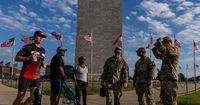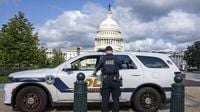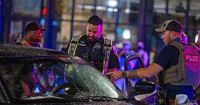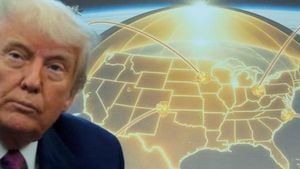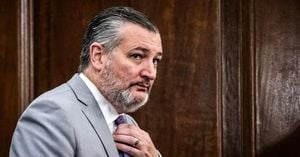In a move that has sent shockwaves through the nation’s capital and reverberated across the political spectrum, President Donald Trump has seized control of Washington, D.C.’s police force, deploying federal agents and National Guard troops in an unprecedented crackdown on crime. Since August 11, 2025, more than 100 arrests have been made in the city, with law enforcement operations intensifying by the day. The president’s intervention, justified as a response to what he calls a “crime emergency,” has stirred fierce debate among lawmakers, city officials, and residents alike.
The federalization of D.C.’s police force began earlier this week when Trump invoked a rarely used provision of the D.C. Home Rule Act, granting him authority to take charge of the Metropolitan Police Department for up to 30 days in conditions deemed an emergency. According to TIME, this marks the first time a president has utilized this measure, which has long been seen as a last resort. Trump’s order also brought in federal agencies such as the FBI, DEA, and Immigration and Customs Enforcement, alongside the National Guard, to patrol the streets and assist in law enforcement activities.
Over the first two nights of the operation, 66 people were arrested, followed by 45 more on August 13. Notably, 29 of those arrested that night were undocumented immigrants, underscoring the operation’s reach into immigration enforcement—a point that has alarmed civil rights advocates and many local residents. The White House told TIME that the reasons for the arrests ranged from outstanding warrants for violent crimes to drug distribution, weapons offenses, and immigration violations.
By August 13, the number of officers involved in the operation had swelled to more than 1,650, up from 1,450 the previous night. National Guard troops, initially numbering around 30, are expected to increase to as many as 800, though as of midweek, they were not directly making arrests. Their primary role, according to NBC News, has been to provide administrative support and protect federal personnel and property. Federal agents from multiple agencies have joined local police in what the administration describes as “proactive targeting”—focusing on known hot spots, individuals with outstanding warrants, and suspected gang members and drug dealers.
The aggressive law enforcement posture has sparked both praise and protest. On August 13, more than 100 residents gathered in the U Street corridor to protest a police checkpoint, chanting “get off our streets” and “go home, fascists” at officers. According to NBC4 Washington, the crowd grew as officers stopped cars and flagged some vehicles for further investigation, resulting in at least one arrest. The demonstration ended without major incident, but it highlighted the deep divisions the operation has exposed within the community.
Some D.C.-area residents have welcomed the federal presence, citing concerns over public safety and the deterioration of public spaces. “I couldn’t be more encouraged by the fact that there are people now that really want to say, ‘Stop, let’s make this better,’” said Christopher Her, a Maryland resident who previously worked in D.C., in comments to NBC News. Others, however, see the crackdown as an overreach. Longtime resident Morgan Komlo called Trump’s federalization of the police “scary” and warned that further exertion of executive power could provoke more protests. “I also have lived here long enough to know D.C. is not going to stand for much,” she added.
D.C. Mayor Muriel Bowser has been outspoken in her opposition, describing Trump’s actions as an “authoritarian push” during a virtual event with constituents. While Bowser acknowledged that the president has the authority to carry out the executive order, she urged residents to “protect our autonomy, to protect our home rule, and get to the other side of this guy.”
Ironically, the president’s justification for the intervention—an alleged spike in violent crime—has been challenged by city officials and recent data. According to the U.S. Attorney’s Office for the District of Columbia, violent crime in the city dropped by 26% in 2025 compared to the previous year, and 2024 saw the lowest level of violent crime in more than three decades. Federal data released in January showed a 35% decrease in violent crime from 2023 to 2024. Nonetheless, Trump has dismissed these statistics, telling reporters on August 14 that D.C.’s crime data “are under investigation right now” and accusing the city of providing “phony crime stats.” He promised, “You’re going to have a very safe, you’re going to have a crime-free city. I mean, I say that—virtually a crime-free city.”
Trump has also floated the idea of extending federal control over the city’s police force beyond the initial 30-day limit set by the Home Rule Act. At a press conference on August 13, he announced plans to seek congressional approval for a “long-term extension” as part of a new crime bill. “If it’s a national emergency, we can do it without Congress,” Trump said, but added that he expects to go before Congress quickly. Under the current law, any extension beyond 30 days requires a joint resolution from both chambers of Congress—a hurdle that may prove difficult given the political climate.
Indeed, the move has triggered a flurry of legislative activity. Representative Andy Ogles, a Republican from Tennessee, has proposed a resolution to remove the 30-day limit entirely, allowing the president to extend control indefinitely by simply notifying congressional committees. The authority would remain in effect unless Congress passes a joint resolution to end it. Ogles argued, “The only way to save it is to federalize the District. President Trump has already stepped up—using the emergency powers granted under the D.C. Home Rule Act—but the 30-day limit in current law is nowhere near enough to undo the chaos Democrats have unleashed.”
Ogles, alongside Senator Mike Lee of Utah, is also pushing the BOWSER Act, which would repeal the Home Rule Act altogether and return control of D.C. to Congress. Meanwhile, Senate Democrats are preparing to fight any further extension of Trump’s authority. Senate Minority Leader Chuck Schumer minced no words, telling podcaster Aaron Parnas, “No f---ing way. We’ll fight him tooth and nail.… He needs to get Congress to approve it, and not only are we not going to approve it, but there are some Republicans who don’t like it either.”
At the heart of the debate is a fundamental question about the balance of power and the future of self-governance in the nation’s capital. Trump’s supporters insist that federal intervention is necessary to “crush lawlessness, restore order, and reclaim our capital once and for all.” Critics, however, warn that the move sets a dangerous precedent, undermining local autonomy and democratic norms. As the days tick by and the operation continues, all eyes remain on Washington—waiting to see how far the president’s experiment in federal control will go and what it will mean for the city, and the country, in the months ahead.
With the city’s streets now a focal point for a larger national battle over crime, governance, and executive power, the coming weeks are likely to be as contentious as they are consequential.
